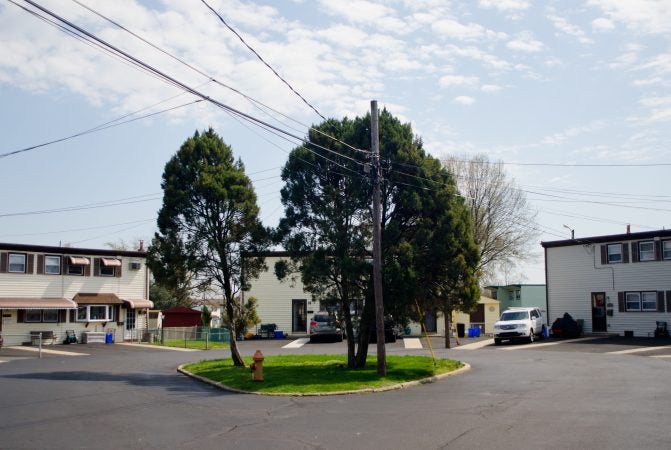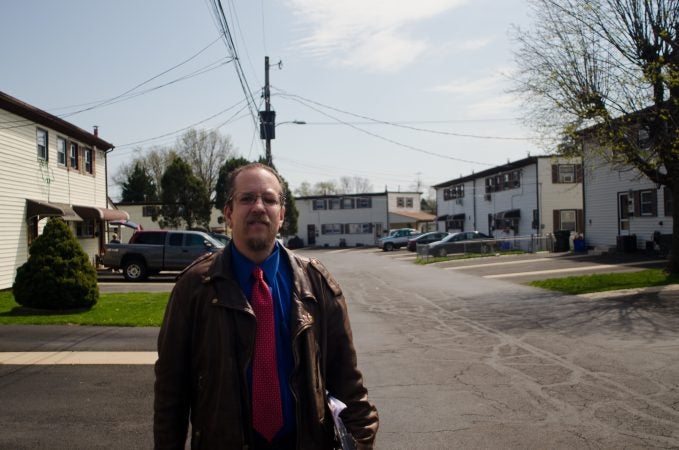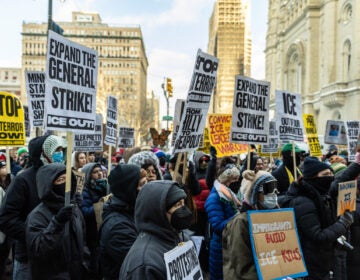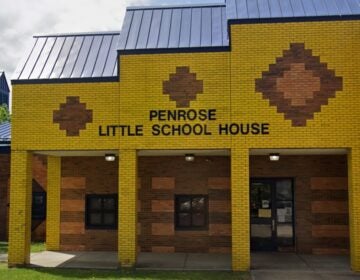Ross Feinberg Wants to “Make The Great Northeast Great Again,” 19152
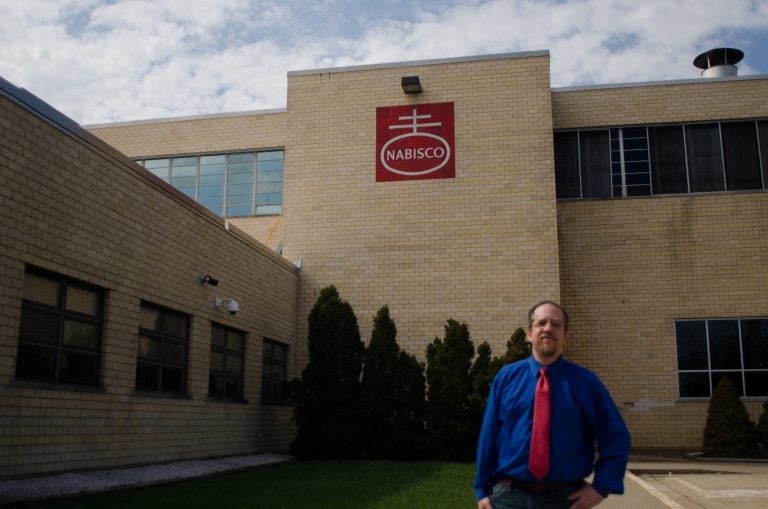
Ross Feinberg poses in front of the shuttered Nabisco Factory on Roosevelt Boulevard. It closed in 2015. (Alex Lewis/Every ZIP gPhiladelphia)
Ross Feinberg misses the scent of cookies on Roosevelt Boulevard. An avid motorcyclist, this Republican candidate for state senate often rode up the arterial highway of the city’s Northeast section to its intersection with Woodhaven Road. There, over a mile from the border with Bucks County, sat the old Nabisco factory. For decades it mass produced confectionary, perfuming the surroundings with the odor of hundreds of thousands of baking cookies. But in 2015 the company closed the factory.
“This was a staple of northeast Philadelphia forever,” says Feinberg. “I’m sad to see that its gone. You still see the remnants of Nabisco, but you don’t smell what used to be going on here. It sad to see the jobs that have had to leave.”
The Nabisco closure is part of a larger movement of the company’s capital to Mexico, which occasioned Republican presidential candidate Donald Trump to forswear Oreos forever. Feinberg isn’t quite willing to go that far—“unfortunately as my middle section has proven out, they are hard resist as my expanding middle section shows”—but he became one of the first Republicans in the city to endorse Trump after the primaries ended. As he knocks on doors in the Far Northeast, home to the largest concentration of Republican voters in this overwhelmingly Democratic city, he makes sure they take note of his familiar-sounding campaign slogan.
Feinberg is canvassing in Pennypack Woods, a cluster of vinyl-sided twin houses built during the Second World War for defense workers. He approaches one voter, a lean man with a dark mustache, and asks him who he supports for president.
“Somebody who’s going to kick ass, Trump,” the man says, quickly.
“Good, if you read the card you’ll see that I’ve taken a page from his book,” says Feinberg, pressing a piece of his literature into the man’s hand. “I want to make the Great Northeast great again.”
The neighborhood is on the southern edge of the Far Northeast, a fiercely independent 25 square mile corner of Philadelphia cut off from the rest of the city by the wooded Pennypack Creek. Until the mid-1950s it remained largely undeveloped farmland and greenery, but it was swiftly gobbled up by both housing and industrial developers who broke from the traditionally dense Philadelphia-style of planning. As manufacturers left many other sections of the city, they poured into the sprawling suburban-style campuses of the Far Northeast. The Philadelphia Industrial Park, which surrounds the Northeast Philadelphia airport, hosted 67 separate factories by 1970, less than ten years after its opening.
Today factories like the Nabisco plant may be closing, but the wounds are far fresher here than in older and long hollowed out industrial areas like Kensington or North Philadelphia. As a result, the Far Northeast could be far more receptive to the kind of message that Trump, and Feinberg, have been relaying this campaign season.
“We need to find ways to bring back good solid jobs to Philadelphia, particularly in the Northeast,” says Feinberg. “I want to see manufacturing brought back here.”
The Far Northeast’s reputation as a place apart is reinforced by the layout of the neighborhoods, which feature far more cul-de-sacs and detached single family homes than any other part of Philadelphia. Partly for that reason, housing tends to be slightly more expensive, median incomes higher, and poverty and violent crime rates lower than city averages. The Far Northeast has also historically been overwhelmingly white. While the Northeast as a whole saw its white population fall from 92 percent to 58.3 percent between 1990 and 2010, according to Pew, that demographic shift is far less pronounced north of Pennypack Creek. The zip code where Feinberg is talking with voters is located, 19114, only fell from 94 percent white in 1990 to 80.1 percent in 2010.
The Democrats only have a two to one voter advantage in the Far Northeast, as opposed to the rest of the city where Republicans are at a seven-to-one disadvantage. As Feinberg nears the end of a cul-de-sac in Pennypack Woods, he approaches an elderly man who asks if he identifies as a conservative.
“You’ve got my vote,” he says, when Feinberg professes that he is, in fact, conservative. Asked about his choice for president, the old man says: “I like Cruz but I’ll vote for Trump first just to change things.” Feinberg draws attention to his own echo of The Donald’s campaign slogan. “We’ve got to get jobs back in here, we’ve lost too many of them over the last year in particular.”
The last Republican to hold the state senate district Feinberg is running for was Frank Salvatore. In a radical gambit Trump probably would have admired, he introduced legislation in Harrisburg during the 1980s that would have allowed the Northeast to secede from Philadelphia as “Liberty County.” Feinberg grew up in the Northeast, and says that these days when people talk about breaking away its more of a tongue-in-cheek thought experiment. But he still echoes many of the sentiments that spurred the 1980s secessionist movement, and have long kept the political, social, and racial contrast with the rest of Philadelphia vividly drawn.
“The Northeast has contributed the vast majority of the tax base here and we get a little bit less in return than we give,” says Feinberg, back at the Republican City Committee Office in Mayfair, before heading out for more primary canvassing. “One of the things about the Northeast, being as Republican-centric as it is, is that that less people are home unless they are seniors or care givers than in other parts of the city that might have more people home. So we might have to knock on a few doors.”
WHYY is your source for fact-based, in-depth journalism and information. As a nonprofit organization, we rely on financial support from readers like you. Please give today.


